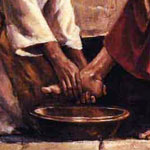In the gospel of John of the washing of the feet, Jesus will call his disciples to love and will show them what he means by offering himself for them. The grain of wheat will die. But it will also rise to new life.

Jesus is not simply setting a goad example in washing the disciples feet. He is initiating something that will save us from the pervasive power of sin: a way of being with one another.
Foot washing was a part of hospitality in Jesus' culture. The roads were dusty. But the washing, normally done before the meal, was carried out by the lowliest slave. How shocked the disciples were when Jesus insisted on washing their feet. Yet, in this gesture, he opened their eyes to the heart of the Gospel: "As I have done for you, so you must do for one another." Jesus' exhortation is not to the keeping of rules but to imitation of his self-gift. It is the invitation to serve one another.
It is a service born of genuine love, a love that is capable of holding even the deepest human evil in the arms of compassion. I've often wondered what Jesus felt inside as he took the feet of Judas into his hands and washed them before the supper. Perhaps it was rage, then compassion, then despair over what was about to happen, hoping that something - anything - might change in the last minute. Imagine what he felt as he looked up into Judas' eyes and realized that in the end, his rage would give way to compassion because he loved Judas too much to condemn him. Knowing all this, Jesus continued to wash his feet and then, to dry them gently. He did this not just for Judas, but for each of the disciples-knowing he would be abandoned, even betrayed by his closest friends. "I don't know who you are talking about," Peter will reply.
Lest we forget, it was into the hands of this very person, Jesus' betrayer, that the Church was placed: "You, Peter, are the rock. And on this rock I will build my church." Build a church on this rock? On a frail and fearful man, weak in character, not true to his friends, dumb, head strong, belligerent? This man? Yes. Because the qualification for priesthood is not strength alone but more, the possession of weakness. It is to know the taste of human dependence and need for God, to be familiar with failure, disappointment, disability because as St. Paul has reminded us, "In weakness, power reaches perfection." Not human power, but the power of God, which always works in ways that seem strange to us.
A classmate in the seminary was one of 17 children. In the middle of the birth order, his brother Paul was born with Down Syndrome. At first the family was horrified. "How will we deal with this?" "What will others think?" But in time, he told me that young Paul taught them what it meant to love one another. In weakness, power reaches perfection. From this weakness, an intimacy is born, in which God's action and power are able to do "more than we can ask or imagine."
We will see this in many ways, but we will most certainly see it in the deepest grace of the Eucharist. And we see it in the priestbood-the exercise of compassion for one another, in which we all share. Here, at this table, we are bound together by Christ, brought deeper into intimacy with him and with one another. So, Jesus makes it possible for us to give of ourselves.
We are grateful for this great sacrament, for the gift of our intimacy with one another, for what is broken that it may be healed, in pain that it may be touched by compassion. We pray in thanksgiving for our weakness and for the extraordinary intimacy it begets. Without this, we would never need Christ and we would never need one another. It is, after all, this urgent need for God and for one another that binds us together.
So, we trust. And we keep in mind the words of Goethe,
And so long as you have not known
This: to die and so to grow,
You are only a troubled guest
On the dark earth!
May God protect us from being only a troubled guest on this dark earth.